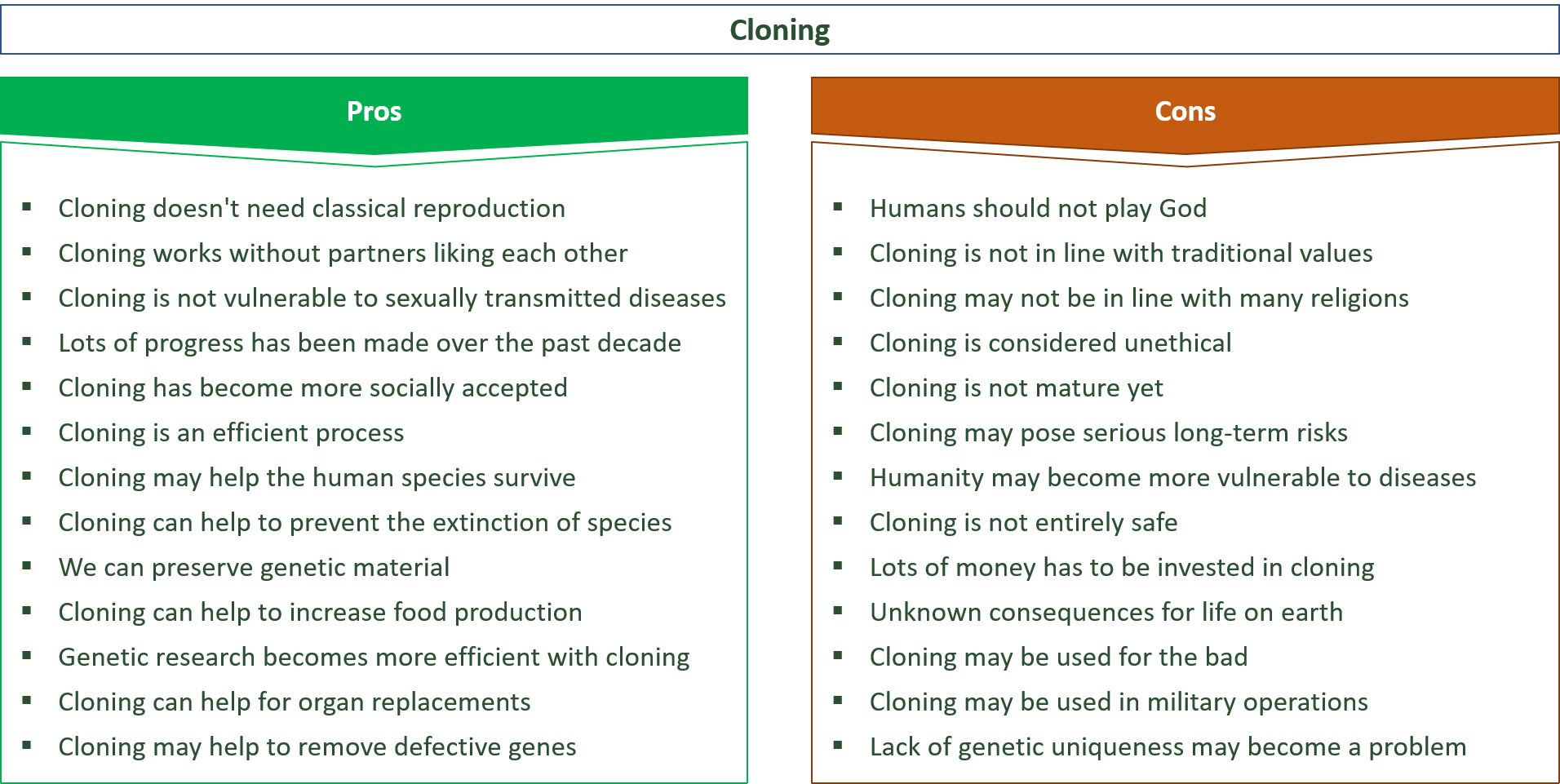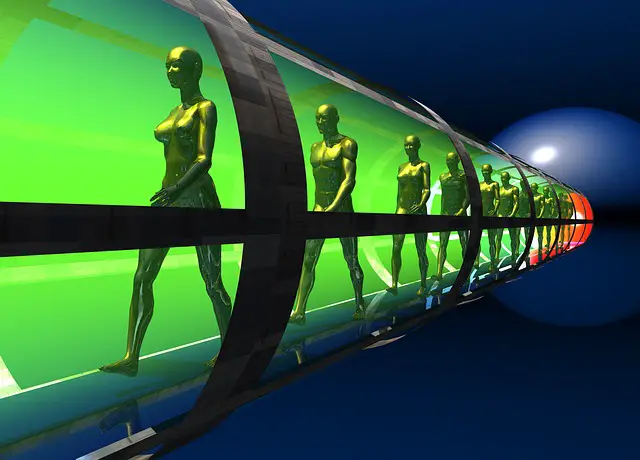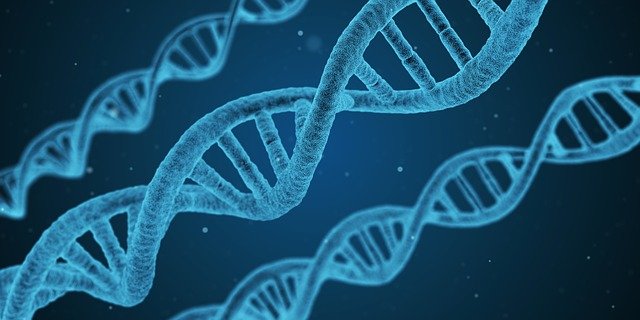Advantages & Disadvantages of Cloning

Cloning is a reproduction process in which individual organisms are produced that have (almost) identical DNA.
In the recent past, the process has been used on many different organisms, including plants and animals.
However, cloning is discussed quite heavily in the scientific world and not everyone is happy with this process.
In the end, even humans could be cloned and humanity may play God which may lead to a serious disaster.
Hence, all the pros and cons of cloning are discussed in the following chapters so that you get a better impression regarding whether we should continue to use cloning even further and finally also clone humans or if the downsides are too severe and we should abandon cloning altogether.
Contents
Advantages of Cloning
- Cloning doesn’t need classical reproduction
- Cloning works without partners liking each other
- Cloning is not vulnerable to sexually transmitted diseases
- Lots of progress has been made over the past decade
- Cloning has become more socially accepted
- Cloning is an efficient process
- Cloning may help the human species survive
- Cloning can help to prevent the extinction of other species
- We can preserve genetic material
- Cloning can help to increase food production
- Cloning can benefit couples who can’t have children in a traditional manner
- Genetic research becomes more efficient with cloning
- Cloning can help with organ replacements
- Cloning may help to remove defective genes
Cloning doesn’t need classical reproduction
One advantage of cloning is that it doesn’t need classical reproduction techniques.
While couples have to find each other and often stay with each other for many months or even years before they have kids, cloning can speed up this process significantly since it doesn’t involve emotions at all.
Cloning works without partners liking each other
While humans have to like and optimally fall in love with each other for having kids and to increase the probability of success significantly, cloning works in a completely different way and we don’t even need couples to make this process work since genes of one individual are already enough to start the process.
Cloning is not vulnerable to sexually transmitted diseases
While humans often have sex with each other to have babies, cloning doesn’t involve sexual intercourse and this also means that there will not be the risk of sexually transmitted diseases and cloning may therefore be regarded as a safer option to reproduce in this regard.
Lots of progress has been made over the past decade
Another upside to cloning is that lots of progress has been made over the past decade and while the cloning process is still not mature yet and needs lots of improvement, chances are that we could use cloning in an efficient manner in the coming years and risks related to cloning may also decrease in the long run.
Cloning has become more socially accepted
While cloning has been considered pretty dodgy just a few years ago, it has gained popularity over the recent past and if this trend continues and people become more open to new things, chances are that cloning will become more socially accepted in the long run.
Cloning is an efficient process
Since cloning is done under laboratory conditions and is supervised by specialists who know what they are doing, it is also a pretty efficient process and once research progresses even further, chances are that cloning will become a much more efficient way to reproduce compared to classical partner models.
Cloning may help the human species survive
Another benefit of cloning is that it may help the human species survive in the long run.
With cloning, we could send humans to many different planets and could make many space missions so that we have humans on multiple planets sooner or later and while our earth may run out of resources and may just no longer be liveable sooner or later, we could still preserve human knowledge by sending our cloned species to different planets.
Cloning can help to prevent the extinction of other species
Cloning can not only be helpful for humans, but it can also help to prevent the extinction of animal and plant species.
In fact, animals have already been cloned in a successful manner and we could use cloning for endangered species before they go extinct to preserve those animals and other organisms for the next generations.
We can preserve genetic material
In general, cloning also helps us to preserve genetic material that would have been lost through traditional sexual reproduction sooner or later.
Cloning can help to increase food production
Cloning can also be pretty helpful for food production since we could replace genes that hinder the growth of plants with more efficient genes and could produce food in a faster manner.
If you are interested in this technique, you should also have a look at all the pros and cons of genetic engineering.
Cloning can benefit couples who can’t have children in a traditional manner
Cloning can also be a great way to have kids for couples who can’t have children in a classical manner since they are infertile so that many families could fulfill their dream of raising kids without having to rely on nature in this regard anymore.
Genetic research becomes more efficient with cloning
There are also many benefits to genetic research when it comes to cloning.
In fact, cloning and genetic research can work closely together and if you are further interested in this topic, you should also have a look at my article regarding the pros and cons of genetically modified organisms (GMOs).
Cloning can help with organ replacements
Cloning can also be quite helpful for organ replacements since in case you have an accident and need an organ to save your life, you just need a clone who can gift you his or her organ and you will be good to go and organs could be mass-produced while they are still a pretty scarce resource right now without the use of cloning.
Cloning may help to remove defective genes
Cloning could also help us remove defective or weak genes so that we could have humans that would be superior in the sense that they might be less likely to suffer from certain health conditions or we might also be able to remove other bad traits.
As you can see, there are many reasons to use cloning.
However, it is still not all sunshine and we also have to talk about all the problems with cloning in the following chapter.

Disadvantages of Cloning
- Humans should not play God
- Cloning is not in line with traditional values
- Cloning may not be in line with many religions
- Cloning is considered unethical
- Cloning is not mature yet
- Cloning may pose serious long-term risks
- Humanity may become more vulnerable to diseases
- Cloning is not entirely safe
- Lots of money has to be invested in cloning
- Unknown consequences for life on earth
- Cloning may be used for the bad
- Cloning may be used in military operations
- Lack of genetic uniqueness may become a problem
- Cloning cannot be done at scale yet
- Designer babies may be the end stage of human cloning
- Loss of identity related to cloning
- Laws may forbid cloning
- Unknown adverse psychological effects of human cloning
- Faster aging of clones may be a problem
Humans should not play God
One downside to cloning is that humans should not play God. In fact, we as a human species have never been meant to get to this stage where we could actually change the way humans work and many scientists are pretty skeptical about this development and suggest that science should not try to get to the level where humans change what makes us humans unique.
Cloning is not in line with traditional values
Cloning is also considered pretty dodgy and unacceptable by conservative people with traditional values.
In fact, it is hard to imagine that traditional people will ever accept the fact that humans could be reproduced without traditional intercourse since it is just considered against human nature.
Cloning may not be in line with many religions
Cloning is also not in line with traditional values at all.
Most religions claim that there is a God or some higher power that leads humanity to a better place.
However, with cloning, humans would get a God-like role and this would just not be accepted by our spiritual leaders.
Cloning is considered unethical
Another problem with cloning is that it is considered unethical and not in line with moral values by many people.
In fact, many people are just scared about cloning and what it means for humanity and our role in the universe in general and also just have a gut feeling that cloning is just not the right way to go.
Cloning is not mature yet
While scientists have made lots of progress with cloning over the past decade, cloning is still not mature enough to clone humans in a safe manner and it will likely still take many years until this will become possible and it is not even entirely certain that this would work at all to produce a healthy human being that will not suffer serious long-term consequences.
Cloning may pose serious long-term risks
Since cloning has not been tried on scale yet, we also don’t know the long-term risks related to this process.
This is not only true for cloning humans but also for cloning animals and various other organisms since our data points are pretty limited and nobody exactly knows what cloning will mean for our well-being and what unexpected risk may come along with it.
Humanity may become more vulnerable to diseases
Another disadvantage of cloning is that humanity may also become more vulnerable to certain diseases since cloning may affect global gene development in the long run and consequences of this process are hard to assess.
Hence, we should be quite careful not to harm future generations through the process of (human) cloning and should not neglect all the issues that may come along with it.
Cloning is not entirely safe
While scientists have made lots of progress regarding the safety of cloning, many of them still claim that cloning is not safe up to this point yet and there will always be some residual risk that something goes wrong.
Lots of money has to be invested in cloning
Cloning is also a pretty expensive process and it also takes lots of research to be able to clone organisms and finally humans in a safe and efficient manner and many billions of dollars may still have to be spent in this regard and may be better used on other humanitarian projects.
Unknown consequences for life on earth
Another risk of cloning is that we still don’t know what the effects of cloning will be on our planet as a whole since life on earth is a complex process and there are so many dependencies between humans, animals, plants and so on and modifying just a single class of organisms may have serious effects on other classes in the long run.
Cloning may be used for the bad
There is also no guarantee that cloning will only be used for good things.
In fact, bad people could use this technology for their purposes and may cause serious damage to humanity in the long run.
Cloning may be used in military operations
Cloning may also be used by countries for military operations.
While it would be quite convenient to produce soldiers on mass-scale, we should not forget that those clones will still be humans in a certain way and it would be quite unethical to sacrifice them in armed conflicts.
Lack of genetic uniqueness may become a problem
Since most of the genes are preserved through cloning, cloning may also lead to a lack of unique genes in the long run and the more cloning, the less likely it will be that humanity will be able to maintain a high level of genetic diversity which would lead to many serious problems in the long run.
Cloning cannot be done at scale yet
Cloning is also not mature enough to be done on scale yet.
While there had been some successes and laboratory trials seem to work, lots of research has to be done before cloning can actually be used on complex living organisms in an efficient manner.
Designer babies may be the end stage of human cloning
Another risk of cloning is that it may also be used to produce so-called designer babies.
Parents may just create their version of a perfect kid through genetic manipulation and we may end up in a world where people will only care about their looks and their attributes and may no longer believe in human values anymore.
Loss of identity related to cloning
Since clones are usually almost identical, there will also be a significant loss of identity related to cloning and clones may not be able to identify themselves as living human being and may get pretty confused in the long run.
Laws may forbid cloning
Cloning is also not allowed in all countries of our planet and it may therefore be pretty difficult to move research in this field forward since many talented scientists may not be able to spend their time with research on cloning due to legal reasons.
Unknown adverse psychological effects of human cloning
Cloning may also cause a number of serious adverse psychological effects on humans and other organisms and may therefore never be a technique that should be used on scale.
Faster aging of clones may be a problem
Since cloning is not mature yet, there is also no proof that clones will have the same life expectancy as normal humans and clones may therefore just age much faster and may live far shorter which may make cloning less economical.

Top 10 Cloning Pros & Cons – Summary List
| Cloning Pros | Cloning Cons |
|---|---|
| Lots of research progress related to cloning | Ethical concerns related to cloning |
| Cloning could help increase food production | Cloning is not accepted by many religions |
| Cloning can help with organ transplantations | Humans should not play God |
| Cloning can help to preserve genes | Unclear long-term risks related to cloning |
| Cloning may help the human species survive | Cloning may lead to psychological disorders |
| Cloning may be the next step in human evolution | Cloning may lower genetic diversity |
| Can benefit couples who are infertile | Cloning is not accepted by the general public |
| Cloning can prevent the extinction of species | Cloning may wipe out humanity |
| Cloning prevents the spread of STDs | Cloning is not allowed in all countries |
| Cloning is an efficient process | Clones may age faster |
Should We Use Cloning?
While cloning has become more mature over the past years and it may help us to avoid the extinction of species and can also be beneficial for organ transplantation, there are still many serious risks related to cloning and cloning may just do much more harm than good for life on our planet in the long run.
Sources
https://en.wikipedia.org/wiki/Asexual_reproduction
https://en.wikipedia.org/wiki/Cloning

About the author
My name is Andreas and my mission is to educate people of all ages about our environmental problems and how everyone can make a contribution to mitigate these issues.
As I went to university and got my Master’s degree in Economics, I did plenty of research in the field of Development Economics.
After finishing university, I traveled around the world. From this time on, I wanted to make a contribution to ensure a livable future for the next generations in every part of our beautiful planet.
Wanna make a contribution to save our environment? Share it!
